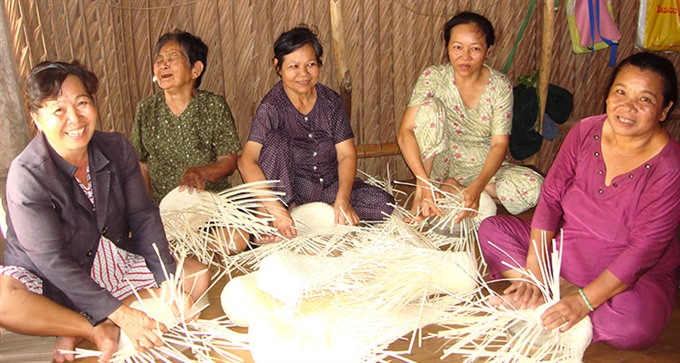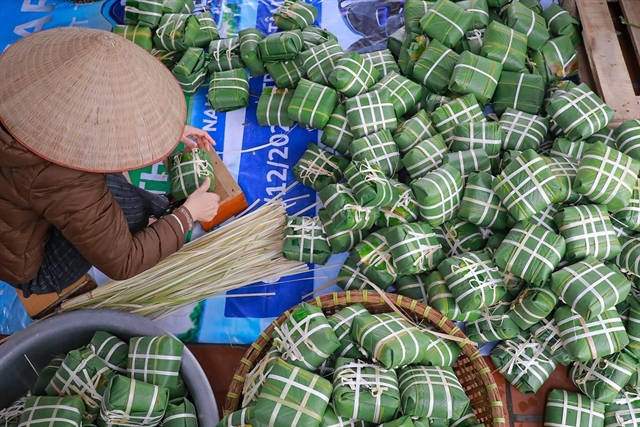 Society
Society

" />Thái Minh Mẫn of HCM City, a physically disabled man who uses a wheelchair, once had to rely on “black credit” to buy laptop bags, electronic parts and other items to sell to students.
 |
| The CEP, a fund for employment of the poor in HCM City and Mekong Delta, has provided low-interest loans to poor workers over the last 25 years. Photo courtesy of the CEP |
Gia Lộc
HCM CITY — Thái Minh Mẫn of HCM City, a physically disabled man who uses a wheelchair, once had to rely on “black credit” to buy laptop bags, electronic parts and other items to sell to students.
But thanks to a HCM City Labour Federation fund, he no longer has to use such dubious credit, which is usually obtained from underground lenders who do not require collateral and only ask for a borrower’s signature.
The former lottery ticket seller received his first loan in 2011 from the Capital Aid Fund for Employment of the Poor (CEP), which offers low-interest loans to the poor in HCM City and the Mekong Delta region.
Before the first loan, Mẫn, 45, sold lottery tickets for 11 years. He could barely afford to buy rice and other food for his family.
Then he heard about the CEP fund, which was set up in 1991 by the Labour Federation.
With the first loan worth VNĐ5 million (US$222) at a low interest rate, Mẫn was able to buy items to sell at the front gate of a university in Gò Vấp District. His income gradually rose.
“My life improved thanks to the loan. I hope the fund raises the maximum loan to VNĐ40 million ($1,777) instead of the current VNĐ30 million ($1.300),” Mẫn said. “A loan of $1,777 could help me open a small motorbike repair shop.”
Another recipient of the fund’s loans was Trần Thị Điểm, who lives in District 8 near the river in a house on stilts with a TV, fridge and washing machine.
In 1981, Điểm and her four children moved to the district from the southeastern province of Đồng Nai and lived on a small boat.
Their income was dependent on fishing and collecting waste on the river to sell to recyclers.
“Food and clothing for my children became a nightmare since my husband had to go to prison due to a death that occurred during a traffic accident he was involved in,” Điểm said.
When CEP staff asked her whether she had ever borrowed money, she was caught by surprise.
“Did anyone dare lend me money? I was too poor,” she told them.
The CEP staff told Điểm that the fund would provide a loan, but she could only afford to borrow VNĐ1 million ($45) to buy buoys and barrels.
The purchases aided her fishing and collection of recycled waste, helping her raise her income and pay back the loan of VNĐ1 million.
Điểm was then able to borrow more money.
“I bought a motor for the boat, and I now have enough money to buy food for my children, and have a small house,” she said, adding that she also now has savings.
Over the last 25 years, the CEP has given 2.9 million loans, totalling more than VNĐ27 trillion (US$1.2 billion), with interest rates varying from 0.5-0.84 per cent.
The fund’s staff also encourages the recipients to save money after they pay back their loans.
Their savings, which are handled by the fund, now totals VNĐ977 billion ($44 million), according to Nguyễn Thị Hoàng Vân, the head of the fund.
Each year, 5,000 to 6,000 people who have received loans from the fund escape from poverty.
Initially, the fund was a pilot programme and only loaned money to people in four districts in HCM City, but then later expanded to all districts.
The fund now has branches in eight neighbouring provinces of Bình Dương, Đồng Nai, Tây Ninh, Long An, Tiền Giang, Đồng Tháp, Vĩnh Long and Bến Tre.
Total capital of the fund in 1992 was VNĐ460 million ($20,600), but is now more than VNĐ2.8 trillion ($125 million).
At a ceremony in late October to celebrate its anniversary, Nguyễn Thị Thu, deputy chairwoman of the city People’s Committee, said the CEP fund had contributed greatly to the city’s poverty reduction programme.
The committee would allocate an additional VNĐ100 billion ($4.5 million) to the fund, Thu said.
She said the fund should also offer loans to workers at industrial parks and processing zones as well as people who live in areas with many rented rooms.
“Any worker with serious financial difficulties can borrow money from the fund,” Thu said.
Tô Duy Lâm, head of the State Bank of Việt Nam’s branch in HCM City, said the bank was considering issuing a licence to the fund so that it could be converted to a microfinance organisation, an effective tool used to reduce poverty in developing countries.
“Establishing a microfinance organisation would provide proper conditions and financial services to poor and low-income earners who cannot access traditional banking services,” he added. -VNS




